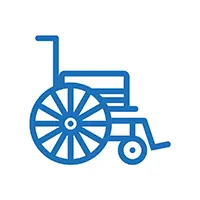Published 23 January 2019
View the When your legs stop working overnight video transcript.
Imagine waking up one day and for no apparent reason, your legs just don’t work anymore.
That’s what happened to Chelsea Corney, 22, from Palmerston North.
She was 19 at the time, living in a flat in Wellington while she finished her studies in travel and tourism.
“I just went to bed as normal and I went up to go to the bathroom at 2 o’clock.
“I went to flick the covers off, as you do, and I went to flip my legs out and they just didn’t move, and I couldn’t feel them either,” Chelsea says.
This was the week before Christmas, 2016.
In total shock, she cried for about an hour before calling an ambulance. She was the only one home at the time.
“I didn’t call my parents right away because I didn’t know what was happening.
“I wanted to find out what was going on before I told them, because otherwise they might start freaking out.”
The diagnosis
Chelsea spent three weeks at Wellington Regional Hospital while doctors assessed her and did some tests.
From the outset, it was obvious what had happened.
The official diagnosis is functional neurological disorder (FND).
There are branches of FND – it affects people in different ways. For example, some people get non-epileptic seizures.
For Chelsea, she can’t use her legs. Her branch is called functional paraplegia.
“Basically it means that something has gone wrong in my brain in the way that it connects to the movement [of my legs],” Chelsea says.
It’s different from people who’ve become paraplegic as a result of physical injury to the brain or spine, or both.
In Chelsea’s case, it’s purely neurological.
“With someone else, they might have a spinal cord injury where the connection’s broken in the spinal cord.
“But in mine the connection is broken in the brain rather than in the spinal cord, so they don’t really know how to fix it.”
Adjusting to a new life
Chelsea returned to Palmerston North to live at home with her younger brother, Trent, and parents, Allan and Deanne.
She spent the next three months struggling to process what had happened to her.
“[I was] basically hiding from everybody because I didn’t want to have to explain to everyone what had happened.”
She found it difficult living at home again because she loved the independence and freedom she had as a student in Wellington.
To make matters worse, she was sent home without a wheelchair. Her family had to try to get one themselves.
But despite those challenges, Chelsea decided not to let those define her life.
She wrote a Facebook post telling her friends what had happened to her, explaining that she has accepted the way she is now.
“There’s no point in sitting around waiting for my legs to come back, because if they don’t then I’ve wasted 10, 20 years of my life.
“I’m just going to get into it and start living my life.”
Seeing the world differently
Chelsea began to see the world through the lens of accessibility.
“We’ll be driving down the road and I’ll be sitting in the passenger seat… and I’ll be thinking, oh yup, I can get into that house, but not that one, or that one, or that one.
“Oh, that one has got a ramp!”
She says something as simple as going shopping is difficult because not all shops are easily accessible for wheelchairs.
Chelsea has also developed a deep empathy for people going through the disability support system, a process that didn’t go well for her.
After being shuffled around the hospital and ending up in places she shouldn’t have been, Chelsea fell through a few cracks along the way.
From difficulties getting the correct equipment, to getting the right support from specialists, she says the system can be a barrier for people.
But she was delighted to be part of a focus group for Enable New Zealand to help make the system better.
Enable New Zealand, which delivers access to resources for people with disabilities, is working on developing a system to make it easier for disabled people to get what they need.
They asked Chelsea, and other local people with disabilities, to help them co-design the new system.
“It’s giving me a chance to help other people that may have gone through the same thing as me, or stop them going through the same thing as me.”
Assumptions people make
Chelsea says the biggest misconception people have is that people with a physical disability also have a mental one.
Conscious or not, that bias is evident when she’s out and about.
“Mum might be standing next to me in a shop and [the salesperson] might start talking to her when they’re actually supposed to be talking to me.”
People also assume, sometimes wrongly, that she needs help.
She says on a recent holiday to the Cook Islands with extended family, almost all of them came up to her one afternoon to ask her if she’d like a drink.
“And it was kind of like… well, if I want a drink I’ll ask for it, but I don’t need everyone coming up to me and assuming I need help.
“If I need help I’ll ask for it, but most of the time I don’t need help because… I still have a lot of upper-body and core strength.”
Making the most of it
After deciding to make the most of her situation, Chelsea rediscovered old passions and found new ones.
She’d been an avid photographer for a few years before her diagnosis, but her disability gave it a new purpose.
On her Facebook page for her photography, Beautiful Moments, she started a series called Wheelie Strong.
“It’s just empowering people with their disabilities through their photography.
“So, getting them out and about in nature, and getting different shots and then when they look back at those pictures, their face was just amazing.”
Chelsea has also stayed active, joining the Manawatu Wheelchair Rugby team earlier this year.
“I just love the community that everyone’s created. You can smash into each other all night long, and then be like, oh do you wanna go out for lunch tomorrow?
“I just absolutely love it. And I mean, I’m not that great at ball skills, but you don’t have to be.
“You can just get in there and have fun, and that’s something that really built me up over the past year, is just being able to get in and have fun at something that I can get into.”
Her disability has also strengthened her social networks and provided her with close friends.
“[My life] has changed dramatically, but to be honest I wouldn’t change it now.
“Two years later, I wouldn’t change it because the people that I’ve met now, and the relationships with other people that I’ve come to know are just amazing.”
One of those people is Quinn, a 13 year-old cancer and stroke survivor whom Chelsea calls her best friend.
“She’s the cutest little gem in the world, I’m so proud to call her my best friend.”
Chelsea loves to stay active. She plays on the Manawatu Wheelchair Rugby team.
Future plans
As well as continuing her photography and playing in the wheelchair rugby team, Chelsea is about to start a new job at StudyLink in Palmerston North.
Her mum has worked there for 20 years and says Chelsea will be the first person in that time to work there in a wheelchair.
“For me that’s really cool, because that’s doing an everyday, normal person’s job, as a normal person.
“It’s really cool to be able to sit at a desk and do my work, just like everyone else.”
View Chelsea’s Wheelie Strong photography series on Facebook. (external link)














